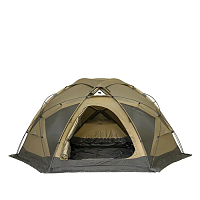Cart
4 Season Tents: What You Need to Know Before Making a Purchase
Introduction:
When it comes to camping in different seasons and weather conditions, having a reliable and durable tent is essential. 4 season tents are specifically designed to withstand the challenges posed by changing climates and provide optimal comfort and protection. In this comprehensive guide, we will explore everything you need to know before purchasing a 4 season tent. From understanding their features and benefits to evaluating factors like materials, design, and usability, this article will help you make an informed decision and choose the right tent for your outdoor adventures.
Section 1: What are 4 Season Tents?
1.1 Defining 4 Season Tents:
1.2 Versatility:
Despite their name, 4 season tents are not limited to winter camping. They can be used in all seasons, making them suitable for year-round adventures in various climates, from alpine expeditions to high-elevation camping.
Section 2: Features and Benefits of 4 Season Tents
2.1 Robust Construction:
2.2 Weather Resistance:
2.3 Enhanced Insulation:
2.4 Superior Ventilation:
2.5 Durability and Stability:
These tents are designed to withstand heavy snow loads and strong winds. Look for features such as strong poles, multiple guy lines, and stake points to ensure stability and prevent collapse in extreme conditions.
Section 3: Factors to Consider When Choosing a 4 Season Tent
3.1 Tent Size and Weight:
3.2 Tent Design:
3.3 Tent Materials:
3.4 Usability and Features:
Evaluate features such as interior pockets, gear lofts, and vestibules for storage options. Additionally, consider the ease of setup, the number of doors for convenient access, and the availability of separate sleeping and living areas.
Section 4: Care and Maintenance
4.1 Proper Storage:
4.2 Cleaning:
4.3 Repairs:
Carry a repair kit with you to address any minor damages while camping. Patch small holes or tears promptly to prevent them from worsening. For major repairs, consult the manufacturer or a professional tent repair service.
Conclusion:
- Contact Us
-

About Pomoly
Pomoly is a leading camping brand specializing in hot tents and tent stoves. We are camping life explorer, Follow Page / Join Group, let's make camping enjoyful together!
Working Hours
Mon-Fri, 09:00 - 17:00

- Company Info
- NEWS
- About us
- Pomoly Name
- Leave-No-Trace
- Contact Now
- Facebook Group
- YouTube Learning
- Contact Us
- Topic Collections
- Policies & Terms
- Payment Policy
- Shipping Policy
- Return & Refund
- Privacy Policy
- Terms of Use
- Tax Policy
- Website Disclaimer
- Safety Disclaimer
- Warranty Policy
- Promotion Policy
- Pre-order Policy
- INTELLECTUAL PROPERTY RIGHTS
- Dealers Agreement And Terms
- Become Affiliate
- User Center
- Forget Password
- My Orders
- Tracking Order
- My Account
- Register
- Popular Searches
-
Tipi Tents Dome Tents Camping Tent Hammock Stove Camping Camping Pellet Stove Circle 6 Titanium Water TankDome X Locomotive 20 LEO 2 camping tent T-Brick 2.0 T1 2.0 tent stove Dweller wood stove Oroqen 2.0 Chimney Water Tank Lumberjack STOVEHUT Bromance 70 Tipi Pomoly Coupon Baker Oven Stove Titanium elbow Fire Pits Tent Stove titanium Stove Outdoor Pellet Stove
keebon pellet stove






